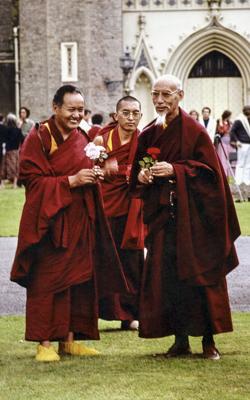Dear Friends,
Thanks for subscribing to our monthly e-letter. Feel free to share it with others!
Once again we want to thank everyone who supported our 2023 year-end appeal. It was a great success and it was all thanks to you.
In this month's issue, we have a new video and podcast to share with you from the archive; the latest installment of the Big Love audiobook heart project; new lamrim teachings given by Lama Zopa Rinpoche from the 40th Kopan Course; updates on free gifts to LYWA Members and Benefactors; a new free audiobook and ebook offering; and a teaching by Rinpoche on The Special Attitude. Please read on and enjoy!
From the Video Archive: Letting Go of the False I
This month from the video archive, we bring you another excerpt from a Dharma discourse given by Lama Zopa Rinpoche at Maitreya Instituut, Amsterdam, in November 1998. In this excerpt, Rinpoche discusses the evolution of the way things appear, how we hold onto this false appearance which is the source of all suffering, and how to let go of these false objects.
Visit and subscribe to the LYWA YouTube channel to view more videos freely available from our archive. See also the FPMT YouTube channel for many more videos of Lama Zopa Rinpoche’s teachings.
On the LYWA Podcast: The Power of the Object of Merit
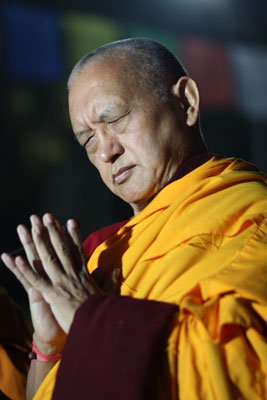 If you don’t practice Dharma, don’t learn Dharma, don’t meditate, if you don’t pray to have realization of the path to enlightenment, at least even the path to liberation, if you don’t do that then so many sentient beings have to suffer for you to live, for your happiness, it is so unimaginable, unbearable, so unbearable.
If you don’t practice Dharma, don’t learn Dharma, don’t meditate, if you don’t pray to have realization of the path to enlightenment, at least even the path to liberation, if you don’t do that then so many sentient beings have to suffer for you to live, for your happiness, it is so unimaginable, unbearable, so unbearable.
-Lama Zopa Rinpoche
This month on the LYWA podcast, Lama Zopa Rinpoche points out that everything we do to keep this human body alive inevitably harms other sentient beings and therefore accumulates negative karma. Rinpoche also points out the incredible power of the object to accumulate huge amounts of positive merit very quickly. Lama Zopa Rinpoche gave this talk before a refuge ceremony at Amitabha Buddhist Centre, Singapore, on January 18, 2009. You can read along with the transcript on our website.
The LYWA podcast contains hundreds of hours of audio, each with links to the accompanying lightly edited transcripts. See the LYWA podcast page to search or browse the entire collection by topic or date, and for easy instructions on how to subscribe.
Big Love Audiobook Heart Project
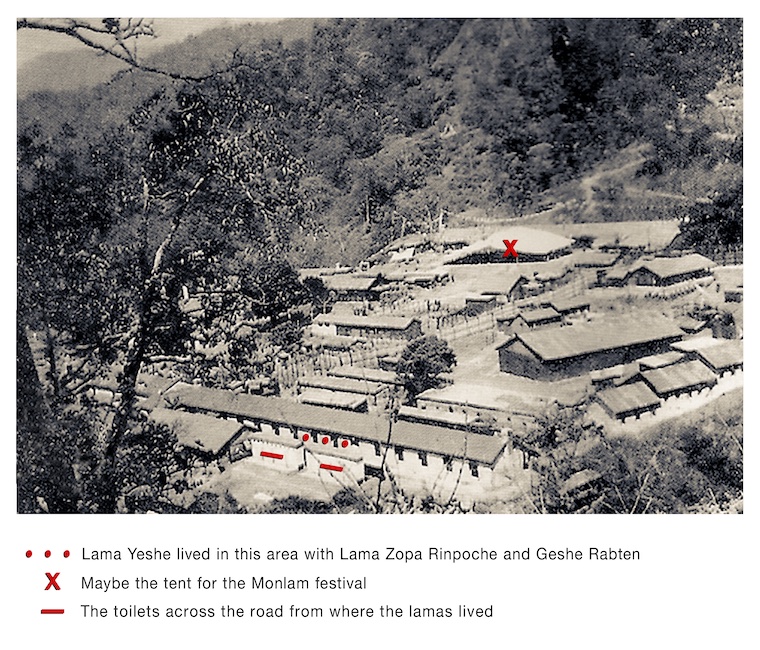 We’re happy to share with you another audiobook installment of Big Love: The Life and Teachings of Lama Yeshe, written by Adele Hulse. Organized by Janet Brooke, this heart project is comprised of narrations recorded by personal friends of the late Åge Delbanco (Babaji), one of Lama Yeshe's earliest students.
We’re happy to share with you another audiobook installment of Big Love: The Life and Teachings of Lama Yeshe, written by Adele Hulse. Organized by Janet Brooke, this heart project is comprised of narrations recorded by personal friends of the late Åge Delbanco (Babaji), one of Lama Yeshe's earliest students.
This month we bring you Chapter 4. 1959-66: Refugee Life in India read by Shasta Wallace. Chapter 4 describes life in the Indian refugee camps, the special challenges facing the Tibetan monastic community living there, and the story of how Lama Yeshe first met and became the teacher of Lama Zopa Rinpoche.
If you are interested in learning more about the early days of exile, you can watch this documentary published by Tibet TV. It documents the stories of monks from Drepung Monastery about their struggles and time living at Buxa Duar.
WHAT'S NEW ON OUR WEBSITE
 This month we have posted the 40th Kopan Course, lamrim teachings given by Lama Zopa Rinpoche at Kopan Monastery, Nepal, in 2007. Topics include the concept of true existence, how to find happiness and peace in our lives, why we need refuge and much more. You can read these teachings online or download a PDF of the entire course. An excerpt from this course is included in the monthly teaching below.
This month we have posted the 40th Kopan Course, lamrim teachings given by Lama Zopa Rinpoche at Kopan Monastery, Nepal, in 2007. Topics include the concept of true existence, how to find happiness and peace in our lives, why we need refuge and much more. You can read these teachings online or download a PDF of the entire course. An excerpt from this course is included in the monthly teaching below.
Every month we share new advices for Lama Zopa Rinpoche’s Online Advice Book, adding more than 100 new entries every year on a variety of topics. More precious than ever, there are now more than 2,200 of Rinpoche’s advices online. Here are a few more:
- The Solution Is Dharma Practice: A student wrote that her relatives had recently passed away and her beloved cat had cancer. She felt sad and low in energy, and asked Rinpoche for practices to help tame the mind and give meaning to her life.
- Confession of Heretical Thoughts: Rinpoche gave this advice to a student who wrote that at times they had heretical thoughts, they felt upset and angry with His Holiness’ advice received in a dream and had considered giving up Dharma.
- Relics Born from Faith: A student saw relics for sale on the internet and asked Rinpoche if they were valid and whether she should buy them.
- Lamrim, Preliminaries and Other Life Practices: This advice was given to a student who had requested life practices and asked about their main deity for Highest Yoga Tantra.
You can always find a list of all the newly posted advices from Lama Zopa Rinpoche on our website.
What’s New for Members and Benefactors
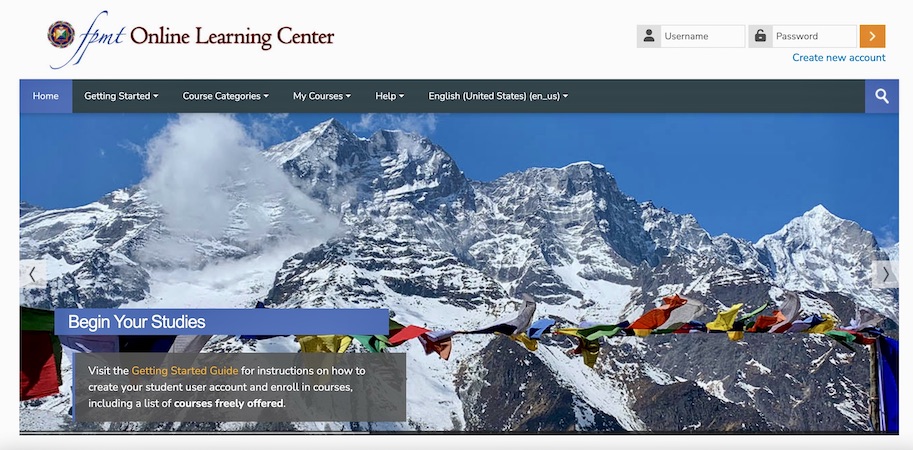 The free gifts for LYWA Members and Benefactors have recently been updated. Along with other gifts, LYWA Members can select one of sixteen FPMT practice booklet PDFs and one Discovering Buddhism or Basic Program module from the FPMT Online Learning Center. Thanks to our friends at FPMT for the generous offer of these materials. Benefactors who donate $250 or more will receive any LYWA publication in print, ebook or DVD, and one FPMT practice booklet. Those who donate $100 or more will receive any LYWA publication. See the complete list of gifts here.
The free gifts for LYWA Members and Benefactors have recently been updated. Along with other gifts, LYWA Members can select one of sixteen FPMT practice booklet PDFs and one Discovering Buddhism or Basic Program module from the FPMT Online Learning Center. Thanks to our friends at FPMT for the generous offer of these materials. Benefactors who donate $250 or more will receive any LYWA publication in print, ebook or DVD, and one FPMT practice booklet. Those who donate $100 or more will receive any LYWA publication. See the complete list of gifts here.
Also new is the option of supporting the Archive with a monthly donation. You can sign up for monthly giving here. A heartfelt thank you to all our donors, as your support helps us continue in our work of bringing the teachings of Lama Yeshe and Lama Zopa Rinpoche to people all over the world.
Free Books for LYWA Members
 Earlier this month we sent out a mailing to LYWA Members offering two new books: Silent Mind Holy Mind by Lama Yeshe and Perseverance, a book by Lama Zopa Rinpoche published by Wisdom Publications.
Earlier this month we sent out a mailing to LYWA Members offering two new books: Silent Mind Holy Mind by Lama Yeshe and Perseverance, a book by Lama Zopa Rinpoche published by Wisdom Publications.
If you are currently a Member of LYWA and have not yet emailed us, please let us know if you would like to receive a copy of Silent Mind Holy Mind or Perseverance, or both. Please specify if you want the print version or the ebook version, and confirm your shipping address and your phone number if you request a print version. We plan to ship Member books out in mid-February.
New Ebook and Audiobook: Silent Mind Holy Mind
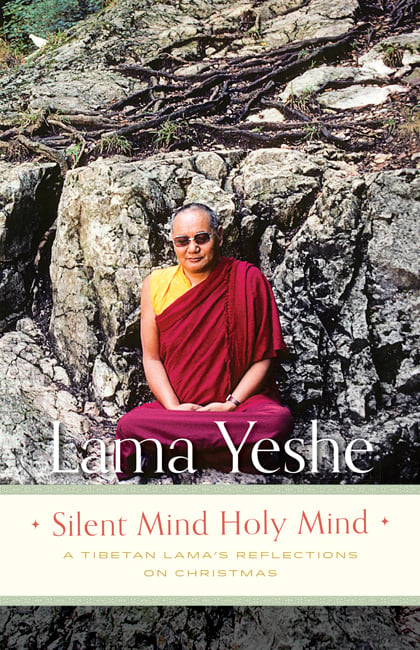 We are happy to share that the ebook and audiobook versions are now available for Silent Mind Holy Mind: A Tibetan Lama’s Reflections on Christmas, by Lama Yeshe, edited by Jonathan Landaw and Nicholas Ribush.
We are happy to share that the ebook and audiobook versions are now available for Silent Mind Holy Mind: A Tibetan Lama’s Reflections on Christmas, by Lama Yeshe, edited by Jonathan Landaw and Nicholas Ribush.
You can access the audiobook for free on Google Play and YouTube, and download your preferred ebook format from Smashwords, Amazon, or Google Play. You can also download a free PDF and access the entire book online on our website.
As always, thank you so much for all your interest in LYWA. Please continue on to read Lama Zopa Rinpoche's teaching on cultivating the special attitude, an excerpt from the recently published 40th Kopan Course.
Big love,

Nick Ribush
Director
THIS MONTH'S TEACHING: The Special Attitude
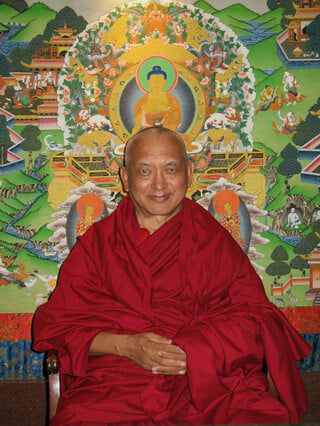 When we have a stable realization of equanimity, when somebody criticizes or cheats us, we don’t get angry. We immediately know that in the past that person benefited us a lot and in the future they will also help us. By thinking of these reasons, because equanimity naturally arises, anger does not arise. Also, in the other way, attachment does not rise. Our mind is stabilized through training.
When we have a stable realization of equanimity, when somebody criticizes or cheats us, we don’t get angry. We immediately know that in the past that person benefited us a lot and in the future they will also help us. By thinking of these reasons, because equanimity naturally arises, anger does not arise. Also, in the other way, attachment does not rise. Our mind is stabilized through training.
Then, on that basis, we see how all sentient beings have been our mother. When we have realization of that, we naturally want to benefit all others, like when Lama Atisha saw a cow outside tied to a stake with a chain, he felt it was so unbearable. He thought, “Oh, my mother is in trouble; she is suffering so much.” He couldn’t bear seeing how this cow, his mother, was chained, caught on that stake. He couldn’t stand to see his mother suffering. Lama Atisha called the cow “Jowo,” meaning “lord” or something like that, referring to her as his mother. He felt like that when he saw not only animals but also people.
There are some people who love animals so much but have a bad feeling for people. They love animals—cats and dogs and so forth—but their compassion is very limited. It’s a political mind, liking one side and not liking the other side. This can happen with different countries or different parties. They like the Democrats but hate the Republicans, or they like the Republicans but hate the Democrats.
That’s why before bodhicitta, before meditating on loving kindness and compassion, we need this mind training, this first foundation realizing the thought of equilibrium, otherwise our compassion is only for some; we don’t have compassion for everybody. We might have compassion for animals, but just some animals or just some people. Maybe we have compassion for our friends who love us, who help us, but not for enemies, those we don’t like or who don’t like us, or for strangers. Because we only have compassion for some people—those who help us, who know us, who are kind to us—that compassion is very limited. We cannot really develop our compassion and loving kindness; we cannot expand it to include all the sentient beings. That means we cannot develop bodhicitta.
And we cannot generate the special attitude, lhag sam, the thought taking responsibility for each and every single sentient being: each and every single hell being, hungry ghost, animal, human being, sura and asura. There are numberless hell beings and we take responsibility for each and every single one of them, this special attitude, taking responsibility to free them from all suffering and bring them to enlightenment. Then, it’s the same thing with the other beings. There are numberless hungry ghosts, so in the same way, we have this special attitude, taking responsibility on ourselves to free them from all suffering and bring them to enlightenment. And the same thing with the numberless beings of the animal realm—we have the special attitude, taking the universal responsibility to free them from all suffering and bring them to enlightenment. We take that responsibility on ourselves. Then, the same thing with the suras, asuras and intermediate stage beings, so for all sentient beings. There are numberless beings in each realm, and we really take responsibility for each and every single one, really taking the responsibility on ourselves to liberate them from all suffering and bring them to enlightenment by ourselves alone. Here, we have that excellent word “alone.”
Here, realizing all sentient beings have been our mother, we see the kindness of the mother sentient beings, and then the thought to repay them arises. The Tibetan word for loving kindness is yi ong jam pa. It is sometimes translated as “affectionate loving kindness,” but I don’t think that is correct because you are describing the mind as affectionate, you are not describing the object, you are not expressing the object of the loving kindness. Yi ong is not the mind, not the loving kindness itself, it’s the object of our loving kindness. We are expressing how beautiful it is, so I translate it as “the loving kindness of seeing others in beauty.”
For example, a thoughtful, compassionate daughter or son will discover how the mother is so kind. It might seem a little funny, talking about the mother and not the father. Usually not mentioning the father might sound funny, but I think this is because the mother is the one who carried us in her body for nine months, who abandoned all her happiness and comfort, all her freedom, to take care of us for nine months. She is also the one who gave birth to us. She didn’t have an abortion. If she had, we wouldn’t have this precious human body, not only for the happiness [of this life] but especially giving us the opportunity to practice the Dharma. We wouldn’t have this, which gives us this opportunity to practice the Dharma. That’s an unbelievable kindness, just by having this human body. But she didn’t have an abortion; she protected us for those nine months and then gave birth to us, enduring unbelievable pain. I’ve seen this on TV many times! There’s usually somebody there, like the husband, patting her, trying to speak nicely to her, trying to distract her mind and she is weeping, in so much unbelievable pain. But she bore all that for us.
Even after that, although the father is there also taking care of us—I think it depends on the family—usually the mother is the one who is with the child all the time. Of course, you can hire somebody afterwards when the mother has to work. However, our mother is the one who spends more time with us and takes care of us, day and night. Usually, not all the time, some children are closer to the father than mother, but mostly children feel close to mother. So, I think that is the main reason when we think of somebody as most kind, most precious, we think of the mother. Then remembering all her kindness, we generate the loving kindness seeing others in beauty. We use that as an example and then try to realize how all sentient beings have been our mother and have been so kind.
What I was talking about before was that when we have the realization, realizing how all beings have been our mother, our attitude in daily life changes, like how Lama Atisha felt with everybody, with human beings, with animals, feeling in his heart that everybody was his mother. If there is somebody, like an insect in trouble, we naturally feel strong compassion, feeling how it is so unbearable. We see our mother is having difficulties and immediately feel it is so unbearable. I mean, we are not shocked, but we feel it is unbearable, with the total realization that this is our kind mother who is suffering. In our daily life, we feel that when we see human beings, when we see animals, insects, any being. We feel they are very close in our heart.
This teaching is excerpted from Kopan Course 40, held at Kopan Monastery, Nepal in November-December 2007. Lightly edited by Gordon McDougall. You can find the entire teaching here on our website.























